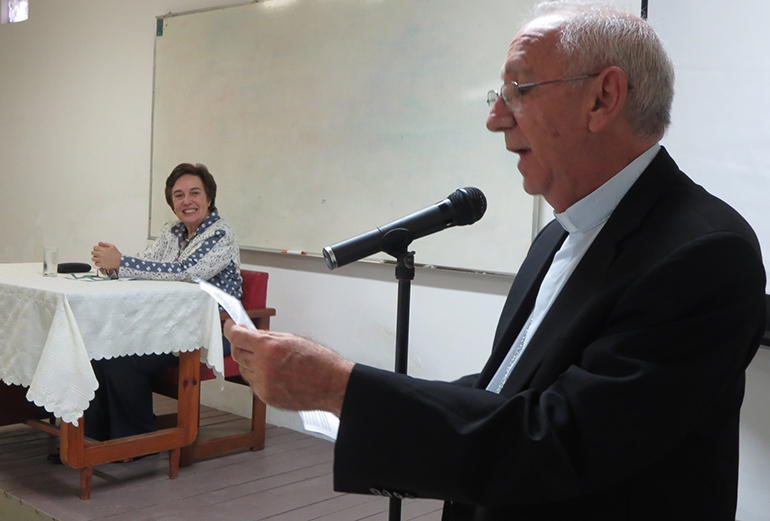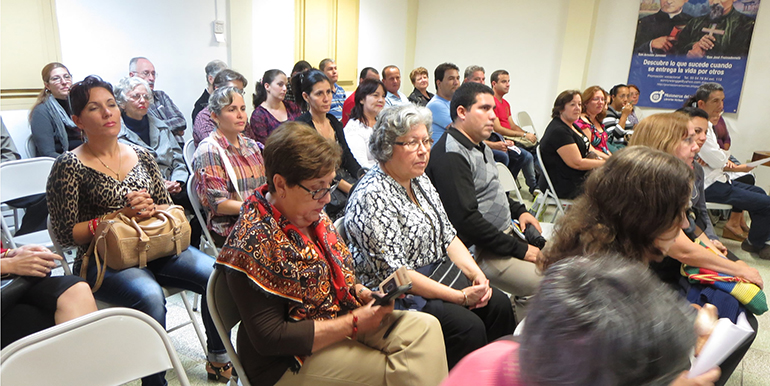By Araceli Cantero - Holguin Catolico

Photographer: ARACELI CANTERO
Bishop Emilio Aranguren, of Holguin, Cuba, introduces Maite Uribe, president of the Teresian Association.
HOLGUIN, CUBA | Addressing a group of Cuban laity of the Diocese of Holguín, the president of the Teresian Association, Maite Uribe, invited the participants to live their baptismal responsibility in the midst of a changing society, stressing several important aspects in their formation.
"Cuba is facing a future that will become increasingly more pluralistic, both in the civil society and in the Church," she said. “This future will challenge the citizens and the communities,” she continued, as she invited her listeners to obtain an updated and anthropological formation "in order to accompany others in their attitudes at this particular moment."
These attitudes, she added, include: the ability to think for yourself, without being swayed by pressures or by trends; the ability to develop critical thinking, to take initiatives, to discern what is better for this historical moment and the capacity to accompany pluralism and diversity, but always from a personal stand and a clear identity. And with all this, to be able to fill with content the vacuum of values that may occur in today’s society.
The Teresian Association is an international association of Catholic laity of Pontifical Right, present in several cities of the United States and in 30 countries. Uribe visited Cuba in order to obtain first hand knowledge of the collaboration of members of the Association in the Diocese of Holguin, in the theological formation of lay educators and communicators.
During the meeting at the Diocesan Center for Lay Formation St. Arnold Janssen, she pointed out as another major attitude to foster in Cuba, the development of a strong inner life of friendship with Jesus that "will help them to live reconciliation and forgiveness." A spirituality that "allows the accompaniment of the different sensitivities in the faith, lived by diverse generations and different cultures.”
She invited her listeners “to
develop a sense of belonging to the Church based on
responsibility and communion.” And she recalled the style of Pope Francis
"seeking out and serving the excluded and marginalized people."
In her talk Feb. 13, she recalled that the Cuban Church celebrates this month the 30th anniversary of the Cuban National Ecclesial Encounter known as ENEC that took place in 1986, which had been prepared with several years of reflection by all Catholic communities on the island and produced a document that has marked the life of the Cuban Church ever since.
She noted the deep coincidences between the commitments made by the Cuban Church at that event: to be an incarnate, prayerful and missionary Church, and the spirituality that St. Pedro Poveda wanted for the members of the Teresian Association: a group committed to the dialogue faith and culture, with a prayerful and missionary character, inspired by the spirit of dialogue and contemplation of St. Teresa of Jesus.
"Join to your faith virtue, and to virtue knowledge," wrote St. Pedro Poveda in 1931, addressing the members. "The spirit is the first element in our work ... but with the spirit I place science, and I believe that spirit and knowledge is the substantial form of the Association. Both things, virtue and knowledge, must be strong and robust."
Uribe highlighted these aspects
having had numerous contacts with the laity in
30 countries where the members of the TA live and work. She shared some of her
experiences in Africa, Asia, America and Europe and as a conclusion she made
reference to the figure of St. Pedro Poveda (1874-1936) and to the Cuban priest
Father Felix Varela Morales (1788-1853) today venerable, who like Poveda was a
committed diocesan priest, educator, seminary professor and writer.
"Both lived their current moment in an incarnated way," she said.
Poveda was involved in the educational issues which occupied the work and political debate at the time, and Varela, in the political action related to the independent future of the nation.
Both were concerned with the future and with youth, and with a singular relevance to their present moment: Poveda with his activities among those on the fringes living in the caves of Guadix; Varela, from his exile, with the immigrants and marginalized in the southern part of Manhattan, New York, where he combined the parish work with his responsibilities as parish Vicar General.
She mentioned the fact that many writings from both of them are preserved. Poveda wrote for the young people carrying out his project, the Teresian Association. Varela, in New York, kept thinking about Cuba and on how to instill civic values into his former students, teaching them to “to think well,” creating in them a greater awareness of the national and cultural identity of the island, and nourishing the dream of a free and sovereign homeland.
Those listening to her in Holguín were familiar with Father Varela’s “Letters to Elpidio,” in which the author addresses his interlocutor Elpidio (“Elpis” in Greek etymology means hope), telling him: “You, Elpidio (hope), tell the youth� that they are the sweet hope of the nation, and that there is no nation without virtue, neither virtue with impiety."
Uribe recalled how, during the recent meeting of Pope Francis with youths at the Varela Cultural Center in the Archdiocese of Havana, he invited them to dream and to live the culture of encounter in order to achieve "the sweet hope of the nation."
He told the young Cubans: “Eh! Open yourselves and dream, dream that
the world
can be different with you. Everyone sometimes dreams of things that will never
happen. But dream, dream, seek new horizons, open up, open yourself up to great
things."
The analogy was clear. In 1933 Spain was going through moments of change in which youth organizations became protagonists of the most radical events in the country. Poveda encouraged the youth of the T.A. not to sit idly. In the Archives of the Association there is the script of a meeting of Pedro Poveda with youth in September of that year.
"Who makes history, who made Spain? The students, the young people. They prepared it and brought it about. Who are those who react? The young. Who are the bravest, the most daring, and risky? The young. Who are those with ideals, those who forget themselves, who kindle the fire? The youths. You ask me now what can you do? You can conquer the world�”
To the audience listening to her conference in Holguin, and recalling these two figures, the TA president said, "You, young at heart, and diocesan laity, I dare repeat with St. Pedro Poveda and with Father Felix Varela: You came to this Church, to this country, to reap the fruits, to live the life that others left. What can you do?
"You are powerful instruments, omnipotent strength of the world. Give thanks to God for being young and for having been brought by God to represent the sacred interests� You are young, you can do anything. Acquire a solid formation and do not forget that ‘You are the sweet hope of the nation.'”

Photographer: ARACELI CANTERO
Catholic laity listen to Maite Uribe in Holguín.

